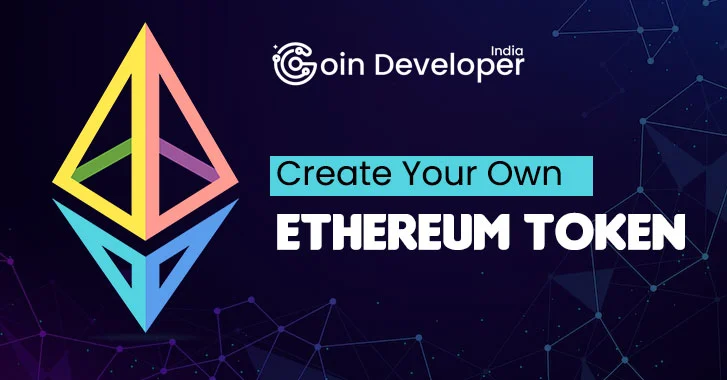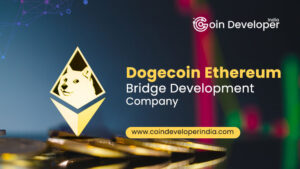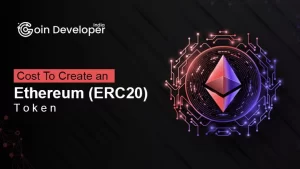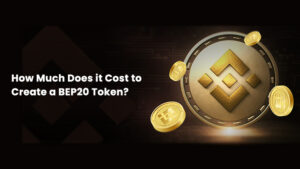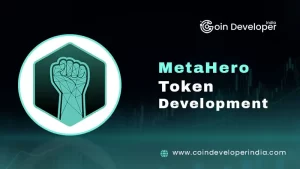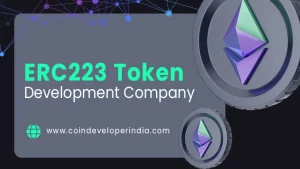Are you interested in the decentralized world of cryptocurrencies and eager to dive into the world of Ethereum tokens?
Building your own Ethereum token using Solidity, which is Ethereum’s programming language, is an enticing journey that allows you to revolutionize the digital economy.
If you are looking to create your Ethereum-based token with Solidity and are confused about where to begin, this blog is for you!
In this guide, we’ll be exploring the essential steps of Ethereum token development. This will help you bring your token idea to life on the Ethereum blockchain platform.
Let’s have a look!
What is Solidity?
Solidity is a programming language primarily used for writing smart contracts on the Ethereum blockchain platform. Smart contracts are self-executing contracts with the terms of the agreement directly written into code.
Solidity was typically designed to target the EVM, or Ethereum Virtual Machine, which is the runtime environment for executing smart contracts on the Ethereum network.
Launch your token with our expert within a week. Drop your query at [email protected] or call/Whatsapp: +91 7014607737
An Overview of Ethereum-Based Tokens
Ethereum-based tokens are digital assets created and managed through smart contracts on the Ethereum blockchain platform. These tokens are available in various standards, such as ERC-20, ERC-721, and ERC-1155, each serving different purposes.
Ethereum-based tokens underpin a vibrant ecosystem of decentralized finance, digital art, gaming, and asset tokenization. These enable new forms of value exchange and ownership on the blockchain platform.
Benefits of Ethereum Token Development
Let’s explore some of the potential advantages of developing Ethereum-based tokens!
-
Scalability & Secuity
At the core of the Ethereum blockchain lies a highly scalable and secure blockchain network. Unlike traditional systems, the Ethereum blockchain’s decentralized nature ensures that the transactions are completely efficient and secure. It’s made possible due to a robust consensus mechanism that’s based on PoW and PoS, which enhances network security and accommodates a high volume of transactions.
-
Interoperability
One of the significant benefits of developing tokens on Ethereum is its interoperability. These can seamlessly interact with other tokens and decentralized applications within the Ethereum ecosystem. This interoperability fosters innovation and creates complex systems that leverage a wide range of applications simultaneously.
-
Smart Contract Functionality
Smart contracts are self-executing contracts with predefined conditions written into the code. These enable developers to automate processes and execute transactions without the need for third parties. Utilizing smart contracts while developing Ethereum-based tokens can facilitate a wide range of functionalities, such as automated payments, token issuance, and decentralized governance.
-
Global Accessibility
Ethereum tokens are known for transcending geographical boundaries, which allows people from all over the world to access them. This borderless ecosystem creates opportunities for entrepreneurs and users worldwide, which fosters widespread economic participation.
-
Tokenization of Assets
The Ethereum blockchain extends its power to the tokenization of both digital and tangible assets. This facilitates fractional ownership and trading of assets, which include real estate or artwork. By making assets more divisible and accessible, the Ethereum blockchain opens a door of opportunities, thus bridging the traditional and digital worlds.
Essential Steps to Create an Ethereum Token with Solidity
Here are the steps that can help you create Ethereum tokens with Solidity:
Step 1: Define the Token’s Purpose & Use Case
Precision plays an integral role in defining the purpose of a token and its use case. Identify whether the token you’re creating is a utility token, a security token, or an ownership representation. Defining the role of your token ensures its effective integration into the blockchain ecosystem.
Step 2: Choose Token Standard
Next, you need to select an appropriate token standard. If you are considering opting for a fungible token, ERC-20 stands as the best option. On the other hand, you can go for the ERC-721 or ERC-1155 token standard, if you wish to develop non-fungible tokens. This decision further defines the token’s properties, laying the foundation for seamless integration and interoperability.
Step 3: Write Smart Contracts
The core of Ethereum-based tokens lies in developing smart contracts that define the tokens. These contracts are responsible for defining the token’s functionalities, rules, and behaviors. Also, security plays an integral role in the crypto ecosystem. Therefore, code diligently smart contracts ensure vulnerability, which helps protect the integrity of the token.
Step 4: Test Token on Testnet
After coding the smart contracts, you need to conduct rigorous testing on Ethereum’s testnet before you deploy them onto the mainnet. This process identifies and rectifies any potential threats and ensures a secure deployment. It will also enhance the token’s reliability and the user experience.
Step 5: Token Deployment
Once testing is completed, deploy the smart contract on the Ethereum mainnet, which will further make the token accessible to a broader audience. This token deployment allows for tangible use cases and interactions. The successful integration of tokens into the mainnet establishes its viability within the community.
Step 6: Market & Community Engagement
The key role in the success of an Ethereum-based token depends on effective marketing and community engagement. Also, you need to engage in active promotion and community interaction so that it fosters adoption and contributes to the token’s success in the long run.
Cost to Create an Ethereum-Based Token
Undoubtedly, this is one of the most searched queries among businesses that are planning to build tokens on the Ethereum blockchain. But, before we get on to the actual Ethereum token development cost, let’s know the factors that affect the cost, which are:
-
Token Characteristics
-
Token Standard
-
Design of the Token
-
The quantity of tokens that you planned
-
Token creation complexity
-
Token Testing
-
Allotment
On average, the cost to develop an Ethereum token ranges somewhere between $5K and $10K, depending on the token standard and specific business needs.
Wrapping Up
Indeed, Ethereum token development serves as a gateway for entrepreneurs to succeed in the blockchain space. The diverse types of tokens, their mechanisms, and the essential steps can provide a solid foundation in the world.
On the other hand, the development process of Ethereum tokens requires one to undergo a lot of technicalities. If you aren’t one of the tech-savvy individuals, ensure that you partner with a professional Ethereum token development company.
Coin Developer India stands out in this field! Leveraging our experience and expertise in the domain, we can help you build Ethereum tokens as per your specific needs. We can even help you drive value and contribute to the advancement of the decentralized economy.
So, get in touch with our experts to get started!
Quick Connect with us:
Call/Whatsapp: +91 7014607737
Mail ID: [email protected]


